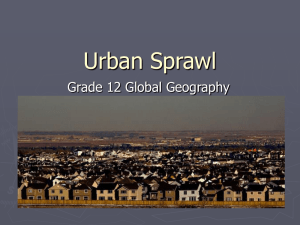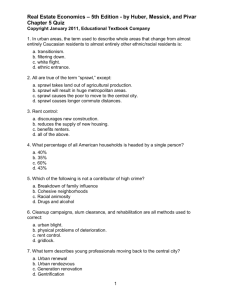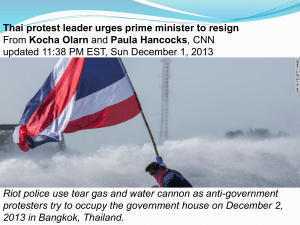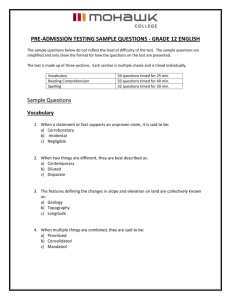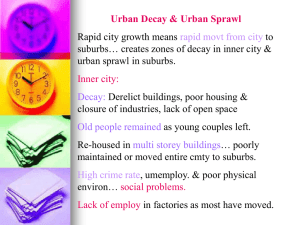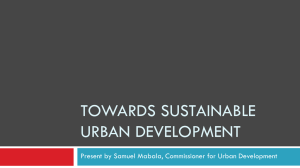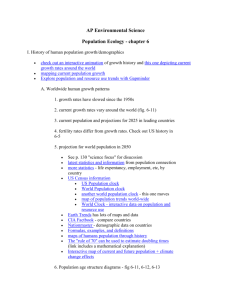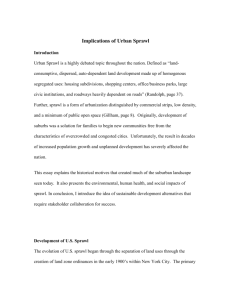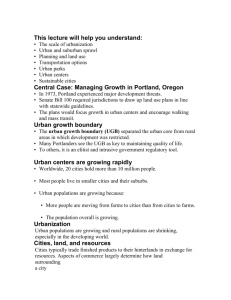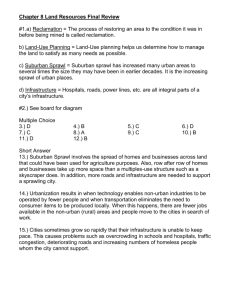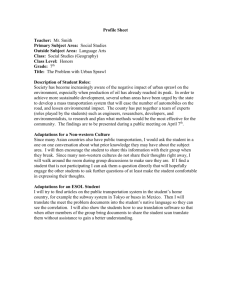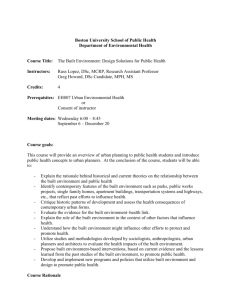Questionnaire Urban sprawl - European Environment Agency
advertisement
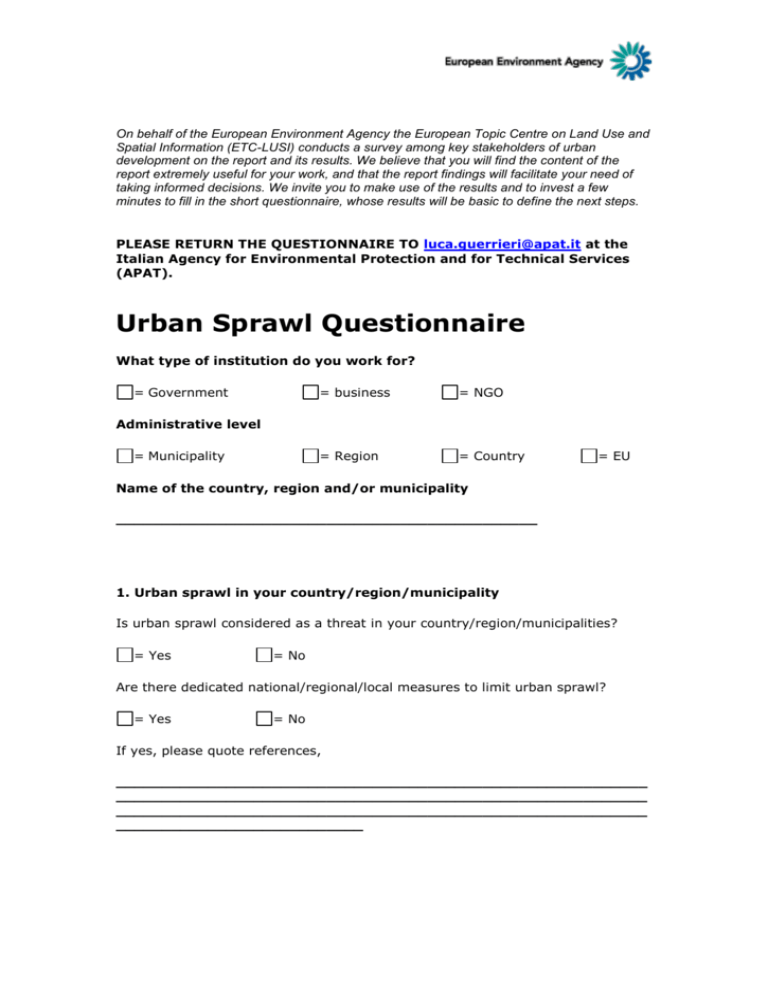
On behalf of the European Environment Agency the European Topic Centre on Land Use and Spatial Information (ETC-LUSI) conducts a survey among key stakeholders of urban development on the report and its results. We believe that you will find the content of the report extremely useful for your work, and that the report findings will facilitate your need of taking informed decisions. We invite you to make use of the results and to invest a few minutes to fill in the short questionnaire, whose results will be basic to define the next steps. PLEASE RETURN THE QUESTIONNAIRE TO luca.guerrieri@apat.it at the Italian Agency for Environmental Protection and for Technical Services (APAT). Urban Sprawl Questionnaire What type of institution do you work for? = Government = business = NGO = Region = Country Administrative level = Municipality = EU Name of the country, region and/or municipality ______________________________________________ 1. Urban sprawl in your country/region/municipality Is urban sprawl considered as a threat in your country/region/municipalities? = Yes = No Are there dedicated national/regional/local measures to limit urban sprawl? = Yes = No If yes, please quote references, __________________________________________________________ __________________________________________________________ __________________________________________________________ ___________________________ 2. Urban sprawl environmental impacts Give a score to the relevance for your country/region/municipality of the following environmental impacts which are connected to Urban Sprawl (score; 1=very low; 2=low; 3 medium; 4=high; 5= very high). Loss of environmental resources 1 2 Consumption of concrete and other building materials 1 2 Expansion of quarries near to natural reserves 1 2 Over extraction of gravel from river beds or ridges 1 2 Loss of soil permeability 1 2 Loss of soil biodiversity 1 2 Hydrological impairment of small watershed 1 2 Other: ___________________________________ 1 2 Efficiency of compact urban areas vs. sprawled areas Growing consumption of energy 1 2 Increase in travel related energy consumption 1 2 Growth in CO2 emissions 1 2 Growing consumption of water 1 2 Other: ___________________________________ 1 2 Natural, protected areas and rural environments Loss of natural habitats 1 2 Loss of best agricultural land 1 2 Increase in the use of water and fertiliser in less 1 2 Consumption of land and soil productive areas Increase in soil erosion in remote areas More noise in rural areas Other: ___________________________________ 3 3 3 3 3 3 3 3 4 4 4 4 4 4 4 4 5 5 5 5 5 5 5 5 3 3 3 3 3 4 4 4 4 4 5 5 5 5 5 3 3 3 4 4 4 5 5 5 1 1 1 2 2 2 3 3 3 4 4 4 5 5 5 1 1 1 1 1 2 2 2 2 2 3 3 3 3 3 4 4 4 4 4 5 5 5 5 5 1 2 3 4 5 1 2 3 4 5 1 2 3 4 5 The quality of urban life and health Increase in air pollution Increase in respiratory problems (such as asthma) High noise level Traffic congestion Insufficient public transport network due to expanding urban area Vulnerability of suburbs to major geo-hazards (volcanic eruption, floods, land subsidence, landslides) Vulnerability of suburbs to minor geo-hazards (local swelling precise what is meant by local swelling, shrinking of clays) Other: ___________________________________ 3. Urban sprawl socio-economic impacts Give a score to the relevance for your country/region/municipality of the following socio-economic impacts which are connected to Urban Sprawl (score; 1=very low; 2=low; 3 medium; 4=high; 5= very high). Social impacts Exacerbation of social and economic division 1 2 3 4 5 1 2 3 4 5 Segregation of residential areas Less social interaction 1 2 3 4 5 Concentration of poor quality neighbourhoods in the inner city 1 2 3 4 5 Other: ___________________________________ 1 2 3 4 5 Increased household expenditure on commuting from home to work over longer and longer distances 1 2 3 4 5 Cost of the congestion for business in sprawled urban areas with inefficient transportation systems 1 2 3 4 5 1 2 3 4 5 Economic impacts Additional costs of the extension of urban infrastructures (transport, waste, waste water …) including utilities and related services, across the urban region Suboptimal use of abandoned industrial areas (brownfields) 1 2 3 4 5 No savings in provision of water and sewage facilities 1 2 3 4 5 Other: ___________________________________ 1 2 3 4 5 4. Local stakeholders responses to urban sprawl Which measures among those that could be taken by local stakeholders (public, private and 3rd sector) are useful to help combating urban sprawl? (score; 1=very low; 2=low; 3 medium; 4=high; 5= very high). Local stakeholders measures Development of long term integrated plans promoting sustainable development and the limitation of urban sprawl Policies for the re-use of derelict brownfield sites and renovation of public spaces to assist in the creation of more compact urban forms Policies for avoiding the use of greenfield sites and complementary urban containment policies Identification of the key partners including the 1 2 3 4 5 1 2 3 4 5 1 2 3 4 5 private sector and community, as well as local, regional and national government and their mobilisation in the planning, implementation and evaluation of urban development Management of the urban-rural interactions via cooperation and coordination between urban authorities and rural and regional authorities in promoting sustainable development Other: ___________________________________ 1 2 3 4 5 1 2 3 4 5 1 2 3 4 5 5. Do you have any further comments/proposals (for instance, there are specific assessments, such as on impacts, drivers or policy measures, you would like to be carried out by the EEA in the future?; or, which measures the EU could take in order to help combating urban sprawl?)? __________________________________________________________ __________________________________________________________ __________________________________________________________ ___________________________ You are welcome to provide us with your contact details, should you consent to be contacted directly in the future. Name ___________________________________ Adress ___________________________________ Phone ___________________________________ Email ___________________________________ PLEASE RETURN THE QUESTIONNAIRE TO luca.guerrieri@apat.it at the Italian Agency for Environmental Protection and for Technical Services (APAT). Thank you for your contribution!
